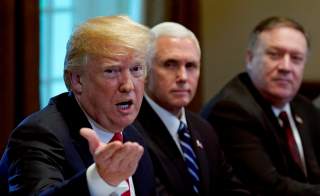Trump's Strategy for the Middle East Is Working
Americans should be pleased that the Russians are now being drawn into what could prove to be a long and costly effort to “do something” in the Middle East.
That is not necessarily the way President Trump sees it. He is counting on the Saudis and the Israelis, joined by Egypt, Jordan and the other Arab Gulf states to stand-up to the Iranians, by using their enormous military power to mention the high financial resources at their disposal, with the United States providing indirect intelligence and military assistance, and ready to intervene only as the “balancer of last resort.”
At the same time, while much of the conventional wisdom has been that the opposition to revoking the by America’s European allies is driven by their business interests in Iran, the fact is that they, and in particular France and the other southern European countries, are even more concerned about the more direct threat that a nuclear Iran and its ballistic missiles could pose to their security. That explains why France was insisting on tougher restrictions on Iran during the negotiations over the JCPOA, and why French President Emanuel Macron is interested in working on some sort of a compromise that would prevent the Iranians from restarting their nuclear military program. He is fully aware that only the United States could guarantee such a deal.
That does not mean that like President Obama before him, President Trump would not find it difficult to juggle the many parts of his Middle East policy, especially when it comes to his vision of an Arab-Israeli military alliance. That would require some sort of an agreement on the Israel-Palestine issue, which could force Washington into another round the hyper Middle East diplomacy. In fact, in the face of rising violence on the Israeli-Palestinian front, he may soon find that he has no choice but to, well, “do something.”
Leon Hadar is a senior analyst with Wikistrat, a geostrategic consulting firm and author of Sandstorm: Policy Failure in the Middle East.
Image: Reuters

